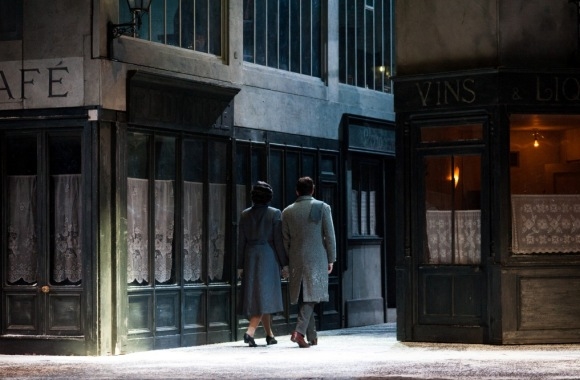
© Tom Bowles
That may be because, for reasons best known to English National Opera‘s movers and shakers, the veteran director’s beautiful and perceptive 1930s-inspired updating of Puccini’s tearjerker is to be prematurely ditched in favour of a snazzier model that’s being imported from Holland. The new one by Benedict Andrews had better be good, because it’s replacing an evocation of photographers’ Paris that’s one of the best things Miller has ever done. We have to hope that the troubled ENO knows how to tell its bathwater from its baby.
Amanda Holden‘s close-rhymed translation is not one of her best but Miller’s designer, Isabella Bywater, fills every inch of that vast stage with atmospheric eye-candy, her locations conjured from a pair of two-storey elements that align and realign to take us from attic stairs to cobbled streets. Although the palette is near-monochrome, telling intrusions like a single red balloon among the white clutch being sold by Parpignol (Philip Daggett) offer sweetly allusive pleasures.
'David Butt Philip lived up to every expectation'
You can’t beat Puccini for passion so it’s unfortunate that this fourth and final incarnation of Miller’s La bohème feels so prosaic. Despite the presence of two attractively credible young leads, Natascha Metherell‘s revival is bloodless and lethargic. She directs crowds well – her Café Momus tingles with excitement – but in the love scenes she fails to ignite the score's blue touch papers and hankies remain firmly in pockets.
The enchanting American soprano Angel Blue has upgraded from 2013’s Musetta to Mimì, and David Butt Philip – a recent alumnus of the Royal Opera’s Jette Parker Young Artists scheme – is Rodolfo to the life, but their relationship is given no dramatic foundation from which it can grow and flower.
Although her soprano is smooth and haloed, Angel Blue doesn’t have the biggest of voices and she needed more sensitive support than conductor Gianluca Marcianò provided at the opening performance. Several times he allowed the orchestra to smother her. Philip, though, lived up to every expectation with a beautifully judged account of a role that tested the upper reaches his youthful lyric tenor but never found it wanting.
Rodolfo’s fellow-students were less vividly portrayed than usual, apart from the Marcello of George van Bergen who overcame some woolly-wooffy vocal moments early on to create an effective partnership with Jennifer Holloway‘s mezzo Musetta. Meanwhile a pair of irresistible cameos from house favourite Andrew Shore – as the landlord Benoît and the cuckold Alcindoro – lent a touch of class that wasn’t always evident elsewhere.












